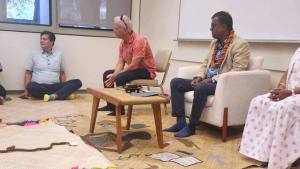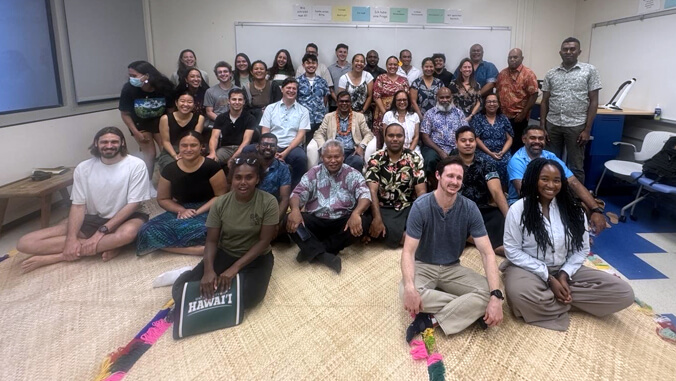
The University of Hawaiʻi at Mānoa welcomed Fiji’s Deputy Prime Minister, Honorable Professor Biman Prasad on March 27, for a lively talanoa—or open conversation—about the future of the Pacific.

The event, hosted by the UH Mānoa Center for Pacific Islands Studies (CPIS), opened with a sevusevu—a traditional kava ceremony of welcome. Woven mats lined the floor and kava, a drink made from a plant native to the Pacific islands, was shared.
The warm welcome set the stage for a thoughtful discussion about the Pacific’s place in a shifting global landscape. Prasad, a longtime academic turned political leader, spoke of the region’s many challenges—from climate change and economic uncertainty to issues of governance. But he also spoke of hope.
“We were extremely thankful that he and his wife took time out of their family holiday to share briefly about the government’s work, both in Fiji and the region,” said Ron Vave, an assistant professor at CPIS. “Also, on the proposed National Research Council by government to, amongst other things, systematize and possibly integrate scholarly research into informing and influencing decision making.”
Penitiko Taoi, a masters student of Fijian descent in UH Mānoa’s Pacific studies department also attended the event.
“I for one was thankful that we could register the concern that U.S. funded Fijian students face and learn of potential government assistance they could tap into,” said Taoi.
Unity: Island nations

Prasad also serves as Fiji’s Minister for Finance. Fiji, often seen as a regional leader, is no stranger to the pressures of climate change, rising costs, and political reform. Prasad called for greater unity among island nations and highlighted the importance of values like democracy, fairness, and cooperation.
Born into a rice farming family in Dreketi, Vanua Levu, Prasad rose to become one of Fiji’s most influential public figures. Before entering politics, he was an economics professor and earned his PhD from the University of Queensland. His life’s work has centered on social justice and inclusive growth.


